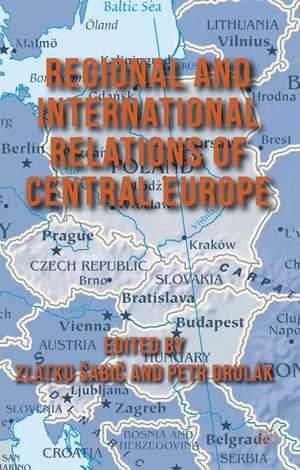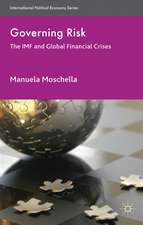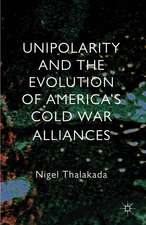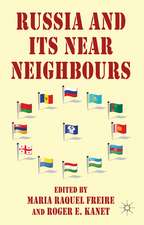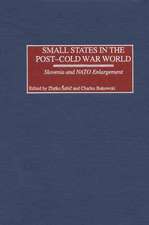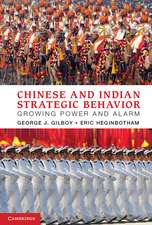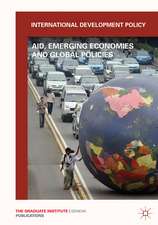Regional and International Relations of Central Europe
Editat de Kenneth A. Loparo, P. Druláken Limba Engleză Hardback – 18 sep 2012
| Toate formatele și edițiile | Preț | Express |
|---|---|---|
| Paperback (1) | 388.72 lei 6-8 săpt. | |
| Palgrave Macmillan UK – 2012 | 388.72 lei 6-8 săpt. | |
| Hardback (1) | 395.47 lei 6-8 săpt. | |
| Palgrave Macmillan UK – 18 sep 2012 | 395.47 lei 6-8 săpt. |
Preț: 395.47 lei
Nou
Puncte Express: 593
Preț estimativ în valută:
75.67€ • 79.23$ • 62.77£
75.67€ • 79.23$ • 62.77£
Carte tipărită la comandă
Livrare economică 09-23 aprilie
Preluare comenzi: 021 569.72.76
Specificații
ISBN-13: 9780230360679
ISBN-10: 023036067X
Pagini: 322
Ilustrații: XV, 322 p.
Dimensiuni: 140 x 216 x 30 mm
Greutate: 0.59 kg
Ediția:2012
Editura: Palgrave Macmillan UK
Colecția Palgrave Macmillan
Locul publicării:London, United Kingdom
ISBN-10: 023036067X
Pagini: 322
Ilustrații: XV, 322 p.
Dimensiuni: 140 x 216 x 30 mm
Greutate: 0.59 kg
Ediția:2012
Editura: Palgrave Macmillan UK
Colecția Palgrave Macmillan
Locul publicării:London, United Kingdom
Cuprins
PART I: INTRODUCTION TO 'CENTRAL EUROPE'; Z.Šabic & P.Drulák About the Name Geostrategic Importance Constructing of the Region the Central European Way What is 'Central Europe' Today? The Structure of the Book In Summary Endnotes References PART II: CENTRAL EUROPE AND IR THINKING: TRADITIONS AND DISCIPLINES; P.Drulák Introduction Ideas and Power in Central Europe Traditions of International Political Thought Masaryk: A Pragmatic Kantian Dmowski: A Moderate Hobbesian Hodža: A Federalist Lockean Bibó: A Progressive Lockean Kardelj: A Communist Kantian Contradictions of the IR Disciplines Conclusions References PART III: THE QUEST FOR CENTRAL EUROPE: SYMBOLIC GEOGRAPHIES AND HISTORICAL REGIONS; C.Iordachi Introduction Symbolic Geographies and the Historical Regions of Europe Defining Central Europe: In-between 'East' and 'West' Central Europe as a Dissident Concept: The Revival of Discourses on Central Europe in the 1980s 'Nesting Orientalism:' Central Europe and the Balkans Romanian Intellectuals as 'Late-comers' to the Central European Club The Balkans: Central Europe's New 'Constitutive Other'? Conclusion: The Concept of Central Europe – a Tool for Comparison Endnotes References PART IV: IS CENTRAL EUROPE A REGION? A VIEW FROM OUTSIDE THE NEIGHBOURHOOD; T.J.Volgy , J.P.Rhamey & E.Fausett Introduction 'Region-ness' An Alternative Conceptualization: 'Neighbourhood-ness' How do we Know if Central Europe is a Neighbourhood? Recognition Through Institutional Signature Substantial Economic Interactions Substantial Political Interactions Substantial Policy Preference Similarity Which States are in the Neighbourhood? Conclusion Endnotes References PART V: AUSTRIA AND CENTRAL EUROPE; P.Luif Introduction Austria until the End of the Cold War Austria After the Cold War Political Relations with Central European Neighbours Austria's Position in Europe Attempts atMultilateral Co-operation Problems in the Bilateral Relations with the Central European Neighbours Attitudes Towards the Neighbouring Countries Economic Relations with the Central European Neighbours Conclusion Endnotes References PART VI: GERMANY AND CENTRAL EUROPE 2011: A DIFFERENTIATED DYNAMIC INSTEAD OF MITTELEUROPA; V.Handl Introduction Living with Asymmetry and Differentiation A New Institutional Basis of Bilateral and Regional Relations Historization vs. Instrumentalization of the Past The EU as the Core Agenda in German-CE Relations The CE EU-Presidencies The Security and Defence Policy and the U.S./Russian Dichotomy Conclusions Endnotes References PART VII: RUSSIA AT THE BORDERS OF CENTRAL EUROPE: CHANGING DYNAMICS IN FOREIGN POLICY RELATIONS; M.R.Freire Introduction Russian Federation Foreign Policy: Multi-vectoral and Pragmatic The Russian Federation's Relations with Central Europe Political and Institutional Developments: Socialization Versus Resistance Security and Defence Realignments: Building Fences or Fostering Co-operative Approaches? Changing Dynamics in the Russian Federation's Relations with Central Europe: Energy Politics at Centre Stage Bilateral Relations The Russian Federation, Poland and the Czech Republic: Fostering Good Neighbourly Relations Poland The Czech Republic The Russian Federation's Views on Hungary, Slovakia and Slovenia: Pragmatic Interdependence Conclusion Endnotes References PART VIII: THE UNITED STATES AND CENTRAL EUROPE: PRINCIPLES AND PRAGMATISM IN THE EVOLVING PARTNERSHIP; T.J.Resler Introduction What's in a Name? How Central is Central Europe? Democratic Peace More Democratic Peace A 'New' Policy? Hopes Dashed? Conclusion Endnotes References PART IX: SECURITY AND SECURITIZATION IN CENTRAL EUROPE; V.Strítecký Introduction Atlanticism in Central Europe Atlanticist Manifestations Consensus Engagement Motivation Energy Security in Central Europe Threat Perception in Central Europe Conclusion Endnotes References PART X:ETHNIC DIVERSITY MANAGEMENT IN CENTRAL EUROPE; P.Roter Introduction National Minorities as a Transnational Issue in Central Europe International Legal-institutional Framework for Diversity Management Minority Protection after World War I: To 'Civilise' Central and Eastern Europe Post-Cold War Minority Protection: Universal Minority Rights to Prevent Conflicts in Central and Eastern Europe Some Practical Effects of New Minority Standards in Central Europe Conclusion Endnotes References PART XI: THE VISEGRAD GROUP ON THE THRESHOLD OF ITS THIRD DECADE: A CENTRAL EUROPEAN HUB?; M.Koran Introduction Points of Departure The Long Journey from 'Four' to a 'Group' Historical Context and Points of Departure Political Determination and Support Flexibility and the 'Art of Disagreeing' Quasi-Institutionalization and Inner Co-operation The Substance of the Co-operation and Strategic Goals Focusing, Prioritizing and Extending Self-Confidence and a Broader Responsibility The Visegrad Group as 'Central Europe'? V4 and the region Conclusion Endnotes References PART XII: EUROPEANIZATION OF FOREIGN POLICY: WHITHER CENTRAL EUROPE?; J.Bátora Introduction Europeanization of Foreign Policy: A Learning Perspective Europeanization of Polish Foreign Policy: Rhetoric of National Interests and Reality of Continuous EU-harmonization Europeanization of Czech Foreign Policy: From Harmonization with CFSP to a Quest for Czech National Interests Europeanization of Slovak Foreign Policy: From CFSP Harmonization to Uncompromising Foreign Policy Standpoints Europeanization of Hungarian Foreign Policy: A Nexus Between 'European Orientation' and Self-centeredness Europeanization of Slovenian Foreign Policy: Steady CFSP-harmonization and No Capacity for National Interests Conclusion Endnotes References PART XIII: POLITICAL ECONOMY OF CENTRAL EUROPE; A.Kuncic & J.Šušteršic Introduction Theoretical Framework Institutions and Varieties of Capitalism Trade and ForeignDirect Investment Convergence of Institutions in Central Europe and Varieties of Capitalism Trade and Foreign Direct Investment Conclusions Endnotes References PART XIV: CENTRAL EUROPE AND THE BALKANS: SO CLOSE AND YET SO FAR; Z.Šabic & A.Freyberg-Inan Introduction Central Europe and the Balkans in the Literature International Organizations and Multilateral Initiatives Shared Across the Regions: The International Institutional Context The V-4, Slovenia, and the Balkans The Balkans in the Foreign Policy Agendas of Central European States Economic Interconnections Conclusion Endnotes References PART XV: CENTRAL EUROPE FACING 'EASTERN EUROPE': SYMPHONY OR CACOPHONY?; S.Ananicz & R.Sadowski Introduction CE States' Approaches towards Eastern Europe Poland Hungary Slovakia The Czech Republic Slovenia Central Europe as a Group Shaping the EU's Eastern Policy Divergent Approaches to Eastern Europe Conclusions Endnotes References PART XVI: CONCLUSIONS: INSTITUTIONS, GEOGRAPHY AND UNCERTAINTY; P.Drulák & Z.Šabic Endnotes References
Notă biografică
SZYMON ANANICZ Analyst at the Centre for Eastern Studies in Warsaw, PolandJOZEF BÁTORA Associate Professor and Director at the Institute of European Studies and International Relations at Comenius University in Bratislava, SlovakiaELIZABETH FAUSETT PhD candidate at the University of Arizona's School of Government and Public Policy, USA and is the Organizational Systems Manager at the International Studies AssociationMARIA RAQUEL FREIRE Assistant Professor in the Department of International Relations at the University of Coimbra and researcher at the Centre for Social Studies (CES) of the University of Coimbra, PortugalANNETTE FREYBERG-INAN Associate Professor at the University of Amsterdam, the NetherlandsVLADIMÍR HANDL Research fellow at the Institute of International Relations in Prague, Czech RepublicCONSTANTIN IORDACHI Associate Professor of History at the Central European University, Budapest, HungaryMICHAL KO?AN Head of Research at the Institute of International Relations, Prague and an Assistant Professor at the Faculty of Social Studies, Masaryk University, Czech RepublicALJA KUN?I? Researcher at the Faculty of Social Sciences, University of Ljubljana, SloveniaPAUL LUIF Lecturer at the University of Vienna, AustriaTAMARA J. RESLER Analyst in Washington DC, USAJ. PATRICK RHAMEY, JR PhD Candidate in Political Science at the University of Arizona, USAPETRA ROTER Associate Professor of International Relations at the University of Ljubljana,SloveniaRAFA? SADOWSKI Senior fellow at the Centre for Eastern Studies (OSW) in Warsaw, PolandVÍT ST?ÍTECKÝ Research fellow at the Institute of International Relations, Prague, Czech Republic and lecturer at the Department of IR, Faculty of Social Sciences, Charles University, Prague, Czech RepublicJANEZ U TER I? Minister of Finance of the Republic of SloveniaTHOMAS J. VOLGY Professor of Political Science at the School of Government and Public Policy, University of Arizona, USA and Executive Director of the International Studies Association
